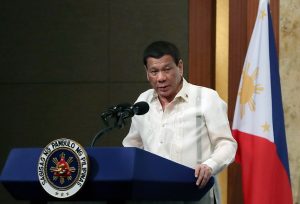The Philippines’ President Rodrigo Duterte has joined Thailand’s Prime Minister Prayut Chan-o-cha in skipping out on tomorrow’s highly anticipated special ASEAN meeting on the crisis in Myanmar.
Presidential spokesperson Harry Roque Jr. said Thursday that Duterte would not join because of the “face-to-face” requirements of the meeting, and would be replaced by Foreign Secretary Teodoro Locsin Jr. This was followed by a formal statement from the Department of Foreign Affairs, which stated that Duterte would skip the summit in order “to attend to pressing domestic concerns in light of the surge of COVID-19 cases.”
“The president, through Secretary Locsin, will convey the Philippines’ commitment to ASEAN’s collective efforts in addressing threats and challenges to peace and stability in the region,” the statement added.
“Secretary Locsin will also express the Philippines’ strong support to the initiative of Brunei Darussalam and the Secretary-General of ASEAN to use their good offices, in accordance with the ASEAN Charter, to visit Myanmar and spearhead ASEAN’s response to the crisis in Myanmar.”
The ASEAN meeting is the culmination of weeks of diplomacy by Indonesia and several other member states, and is hoping to open the way to a negotiated settlement to the political crisis that has dragged Myanmar into chaos since the military’s seizure of power on February 1.
Prayut’s government has offered COVID-19 as a rationale for his own absence, with Thailand experiencing its worst outbreak of the disease, reporting a record high of more than 2,000 cases on Friday.
However, it is not hard to draw the conclusion that Prayut, who also seized power in a coup in 2014 before laundering it via semi-democratic elections in 2019, is keen to avoid confrontation with Sen. Gen. Min Aung Hlaing. After all, the Tatmadaw and the Royal Thai Army enjoy close relations.
As Thitinan Pongsudhirak of Chulalongkorn University pointed out in the Bangkok Post today, Min Aung Hlaing, considers himself an adopted son of the late Gen. Prem Tinsulanonda, a former Thai prime minister and president of the Privy Council, which advises the country’s powerful monarchy. Shortly after the coup, Min Aung Hlaing wrote to Prayut asking his help to “support democracy” in Myanmar.
How much will the absence of Duterte and Prayut matter? As I’ve previously noted, the ASEAN Summit faces a host of thorny diplomatic challenges, beginning with the fact that neither of Myanmar’s two warring factions has shown any interest in the dialog and compromise that is the bloc’s most likely salve to the crisis. These challenges will remain nearly insurmountable regardless of who represents the other nine ASEAN nations.
In Duterte’s case, there is an argument to be made that at least in terms of personal style, Foreign Secretary Teodoro Locsin might actually be an improvement. Since the coup, Locsin has been personally outspoken about the situation in Myanmar, considerably so by ASEAN standards. On March 2, he called for the “immediate release of Daw Aung San Suu Kyi and subsequent dialogue among the parties involved in their country’s destiny.”
On his Twitter account, he has also praised the deposed leader and criticized the “calumnies from the hypocrites of the West,” for abandoning her over the military’s violent treatment of the Rohingya Muslims. All this suggests that he is likely to be more forthright than would the laconic Duterte.
At the same time, perception is hugely important in diplomacy. While these leaders’ absence will make little difference to the concrete proceedings on Saturday, it does carry symbolic weight, as a sign of ASEAN’s ability – or inability – to muster a united front in the face of the bloodshed being visited by the Myanmar military on its own people.
Thitinan of Chulalongkorn University wrote yesterday that in the run up to the meeting, “what goes into it is likely more telling that what will come out of it.” Without the attendance of Thailand’s head of government, “ASEAN’s highly anticipated ‘special’ summit tomorrow in Jakarta on Myanmar’s crisis can be declared moot on arrival.”

































